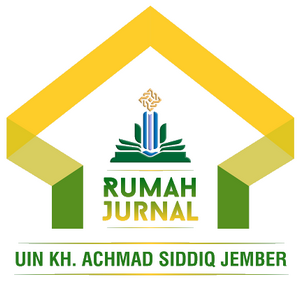Resolving an Inherent Controversy: How Pesantren’s Philosophical Ideals Confront the Reality of Bullying
DOI:
https://doi.org/10.35719/aladalah.v28i1.484This article examines how philosophical values embedded in the pesantren tradition can be operationalised into a contextual anti-bullying program. Using a qualitative case study of Pesantren Nurul Yaqin (Indonesia), the study triangulates in-depth interviews with eight key participants (a pesantren leader, five educators, and two students), participatory observation, and document analysis. Data were analysed through iterative thematic coding. The findings suggest that bullying in pesantren is repeated peer aggression sustained by power imbalance. At the same time, severe incidents may be contained when a strong moral ecology regulates institutional life. At Pesantren Nurul Yaqin, four ideals such as tawadhu’, ukhuwah Islamiyah, silaturahim, and ihsan, function as moral anchors that restrain domination, strengthen belonging, and activate prosocial defending. However, the study also identifies the limits of informal norms; values may be unevenly applied and insufficient when victims hesitate to disclose harm. Accordingly, the article proposes a values-based, Whole-School Approach-aligned protocol that formalises local wisdom into safeguards, including a confidential reporting mechanism, a peer-inclusive anti-bullying team, staged restorative responses, educator role-modelling, and parent or community engagement.
Downloads
References
Abdurrohim, A., Fitriani, E., Akbari, M. Y. A., Bachtiyar, M., Fuad, A. Z., & Syaifudin, M. (2024). Exploring Anti-Bullying Strategies in Islamic Boarding Schools: A Comparative Study of Indonesia and Malaysia. Al-Ishlah: Jurnal Pendidikan, 16(3). https://doi.org/10.35445/alishlah.v16i3.5448
Andrews, N. C. Z., Cillessen, A. H. N., Craig, W., Dane, A. V., & Volk, A. A. (2023). Bullying and the Abuse of Power. International Journal of Bullying Prevention, 5(3), 261–270. https://doi.org/10.1007/s42380-023-00170-0
Asrin, Anshori, A., Shonhaji, Mawardi, Imron, I., & Setiawati, R. (2024). The Ideal Pattern of Social Integration Based on the Quran (Thematic Study of Verses on Social Integration). AL QUDS: Jurnal Studi Alquran Dan Hadis, 8(3), 659–674. https://doi.org/10.29240/alquds.v8i3.11330
Aziz, A. N., Madjid, A., & Partino, R. (2025). Integrating Religious and Psychological Constructs: A New Scale for Measuring Panca Jiwa Pondok in Islamic Boarding Schools. International Journal of Islamic Educational Psychology, 6(1), 1–29. https://doi.org/10.18196/ijiep.v6i1.26598
Azizah, N. R. R., & Sa’adah, N. (2025). Causes of bullying and strategies for prevention in pesantren: A holistic approach to creating an inclusive environment. Asatiza: Jurnal Pendidikan, 6(1), 63–76. https://doi.org/10.46963/asatiza.v6i1.2571
Baharun, H., Sholihah, I., & Imam, O. A. (2025). Optimizing the Quality of Anti-Bullying Education Services in Islamic Boarding Schools. POTENSIA: Jurnal Kependidikan Islam, 11(1), 100–116. https://doi.org/10.24014/potensia.v11i1.35937
Bernardi, D. A., & Steyn, F. (2023). Evaluation of a Faith-Based Intervention for Intimate Partner Violence With Men and Women Referred by the Court in South Africa Utilising the DASS42. Gender & Behaviour, 21(3). https://hdl.handle.net/10520/ejc-genbeh_v21_n3_a18
Brown, R. D. (2021). Property Ownership and the Legal Personhood of Artificial Intelligence. Information & Communications Technology Law, 30(2), 208–234. https://doi.org/10.1080/13600834.2020.1861714
Bussey, K. (2023). The contribution of social cognitive theory to school bullying research and practice. Theory Into Practice, 62(3). https://doi.org/10.1080/00405841.2023.2226549
De Luca, L., Nocentini, A., & Menesini, E. (2019). The Teacher’s Role in Preventing Bullying. Frontiers in Psychology, 10. https://doi.org/10.3389/fpsyg.2019.01830
Deng, X., Yang, J., & Wu, Y. (2021). Adolescent Empathy Influences Bystander Defending in School Bullying: A Three-Level Meta-Analysis. Frontiers in Psychology, 12(690898), 1–10. https://doi.org/10.3389/fpsyg.2021.690898
Dewi, R., Afrianti, I. S., Zahara, C. I., Suzanna, E., Junita, N., Zara, N., Rahmawati, & Rafalina, F. (2025). Psychoeducational Activities and Early Detection of Bullying for Santriwati: Prevention Efforts in the Islamic Boarding School Environment. International Journal of Community Care of Humanity (IJCCH), 3(6). https://journal.lsmsharing.com/ijcch/article/view/286
Garandeau, C. F., Laninga-Wijnen, L., & Salmivalli, C. (2022). Effects of the KiVa Anti-Bullying Program on Affective and Cognitive Empathy in Children and Adolescents. Journal of Clinical Child & Adolescent Psychology, 51(4), 515–529. https://doi.org/10.1080/15374416.2020.1846541
Harte, P., & Barry, M. M. (2024). A scoping review of the implementation and cultural adaptation of school-based mental health promotion and prevention interventions in low-and middle-income countries. Cambridge Prisms: Global Mental Health, 11(e55), 1–21. https://doi.org/10.1017/gmh.2024.48
Hidayah, L., & Wahyudi, W. E. (2025). The Role of Teachers in Addressing Bullying Behavior in Islamic Schools: Approaches and Best Practices in MAN 2 Lamongan. J-PAI: Jurnal Pendidikan Agama Islam, 11(2). https://doi.org/10.18860/jpai.v11i2.29082
Hidayati, A., Marianty, D., & Kamila, A. (2025). Effectiveness of School Interventions in Reducing Bullying Behavior: Systematic Literature Review. Journal of Psychological Perspective, 7(1), 29–40. https://doi.org/10.47679/jopp.7110222025
Hong, J. S., & Espelage, D. L. (2012). A review of research on bullying and peer victimization in school: An ecological system analysis. Aggression and Violent Behavior, 17(4), 311–322. https://doi.org/10.1016/j.avb.2012.03.003
Huberman, M., & Miles, M. B. (2002). The Qualitative Researcher’s Companion. Sage Publications.
Kadir, A., & Umiarso. (2023). The Effectiveness of Leadership, Coaching Systems, and Organizational Climate on the Work Effectiveness of Boarding School Caregivers. International Journal of Instruction, 16(3), 655–676. https://e-iji.net/ats/index.php/pub/article/view/100
Kent, T. S., Freischlag, J., Minter, R., Hawn, M., Al-Refaie, W., James, B. C., Eskander, M., & Chu, D. (2020). Overcoming a Hostile Work and Learning Environment in Academic Surgery—Tools for Change at Every Level. Journal of Surgical Research, 252, 281–284. https://doi.org/10.1016/j.jss.2019.12.055
Khadka, C. (2024). Social Learning Theory and the Development of Aggression. Medha: A Multidisciplinary Journal, 7(1), 79–92. https://doi.org/10.3126/medha.v7i1.73897
Kirom, M. (2025). Barikan, Islamic values and social-religious life integration: A living Quran and hadith study. Al-Tahrir: Jurnal Pemikiran Islam, 25(1), 41–56. https://doi.org/10.21154/altahrir.v25i1.10212
Lehmann, P. S., Wingert, A. C., & Jones, M. S. (2025). Bullying Victimization, Gender, and Adolescent Substance Use: The Moderating Role of School Connectedness. Crime & Delinquency, 71(10), 3269–3298. https://doi.org/10.1177/00111287241242481
Mala, A., Zulkarnain, Z., Bakar, M. Y. A., & Marpuah, S. (2024). Fostering Tolerance Through Inclusive Islamic Education: The Role of Pesantren in Navigating Global Challenges. Jurnal Pendidikan Agama Islam (Journal of Islamic Education Studies), 12(2), 153–178. https://doi.org/10.15642/jpai.2024.12.2.153-178
Malik, A. (2017). Stigmatization of Islamic School: Pesantren, Radicalism and Terrorism in Bima. Ulumuna, 21(1), 173–210. https://doi.org/10.20414/ujis.v21i1.1159
Margas, N. (2023). Inclusive classroom climate development as the cornerstone of inclusive school building: Review and perspectives. Frontiers in Psychology, 14. https://doi.org/10.3389/fpsyg.2023.1171204
Menesini, E., & Salmivalli, C. (2017). Bullying in schools: The state of knowledge and effective interventions. Psychology, Health & Medicine, 22(sup1), 240–253. https://doi.org/10.1080/13548506.2017.1279740
Meroni, C., & Velasco, V. (2023). School-Based Interventions for Migrant Students in the Framework of the Health Promoting Whole-School Approach: An Umbrella Review. Sustainability, 15(3), 1894. https://doi.org/10.3390/su15031894
Mujahid, I. (2021). Islamic orthodoxy-based character education: Creating moderate Muslim in a modern pesantren in Indonesia. Indonesian Journal of Islam and Muslim Societies, 11(2), 185–212. https://doi.org/10.18326/ijims.v11i2.185-212
Nielsen, M. B., Finne, L. B., Parveen, S., & Einarsen, S. V. (2022). Assessing Workplace Bullying and Its Outcomes: The Paradoxical Role of Perceived Power Imbalance Between Target and Perpetrator. Frontiers in Psychology, 13. https://doi.org/10.3389/fpsyg.2022.907204
Nuryadi, S., Prayitno, I., Kumoro, D. F. C., & Sukirman. (2025). A Model of Character Development for Santri: The Role of Ethical Leadership, Value Development, and Character-Based Learning Mediated by Students’ Experiences. International Journal of Social and Management Studies, 6(1), 15–23. https://doi.org/10.5555/ijosmas.v6i1.463
Podiya, J. K., Navaneetham, J., Bhola, P., Arelingaiah, M., G. Prabhu, S., Nag, R., Arasanahalli Lakshman, K., & Hugh-Jones, S. (2025). Anti-Bullying Interventions for Secondary School Adolescents in India: A Systematic Review and Narrative Synthesis. International Journal of Bullying Prevention. https://doi.org/10.1007/s42380-025-00308-2
Ramli, A., Dhahri, I., Solehuddin, M., Rahmah, S., Haris, M., & Lubis, F. M. (2023). The Urgency of Islamic Character Education to Anticipate Bullying Behavior in Boarding Schools. At-Ta’dib, 18(1), 1–9. https://doi.org/10.21111/attadib.v18i1.9823
Ramli, S., Handoko, Y., & Ainina, N. M. (2024). The dynamics of bullying in Islamic Boarding Schools: An analysis of the causal factors and their impacts. Indonesian Journal of Islamic Religious Education, 2(2), 115–126. https://doi.org/10.63243/vbmm6w55
Rijal, A. P. (2025). The Role of Character Education in Preventing Bullying Behaviour in Islamic Boarding Schools. Dirasah: Jurnal Studi Ilmu Dan Manajemen Pendidikan Islam, 8(1), 323–336. https://doi.org/10.58401/dirasah.v8i1.1619
Rofiki, M., Baharun, H., & Badriyati, L. (2025). Enhancing Student Resilience through Anti-Bullying Policies: A Qualitative Study. Tarbawi: Jurnal Keilmuan Manajemen Pendidikan, 11(01), 161–176. https://doi.org/10.32678/tarbawi.v11i01.11304
Rozi, F., Mufidah, A. L., Munif, M., & Qodriyah, K. (2025). Internalizing Pesantren Values to Prevent Violence Among Santri. Andragogi: Jurnal Pendidikan Dan Pembelajaran, 5(1), 71–87. https://doi.org/10.31538/adrg.v5i1.1821
Sanusi, S., Suraiya, N., Nurasiah, N., Qismullah Yusuf, Y., Ridha, S., Hikmah, N., & Leni, L. (2025). Social Knowledge Management to optimize adolescents’ social studies learning in Banda Aceh, Indonesia. Cogent Education, 12(1), 2506062. https://doi.org/10.1080/2331186X.2025.2506062
Shim, T., & Ye, C. (2024). Teachers’ Roles in Coping with School Violence from the Perspectives of Prospective Teachers: A Q Methodological Approach. Behavioral Sciences, 14(11), 1099. https://doi.org/10.3390/bs14111099
Suryadi, S., Ilmi, A. F., & Sukamto, S. (2023). Growing The Value of Islamic Religious Education to Prevent Bullying Behavior in Islamic Boarding Schools. Edukasi Islami: Jurnal Pendidikan Islam, 12(02). https://doi.org/10.30868/ei.v12i02.3988
Suwendi, S., Gama, C. B., Farabi, M. F. F., Fuady, F., & Arman, A. (2024). Roles and challenges of pesantren intellectual networks. Jurnal Ilmiah Islam Futura, 24(2), 453–470. https://doi.org/10.22373/jiif.v24i2.23134
Warsah, I., Morganna, R., Warsah, B. A. A., & Warsah, B. H. H. (2024). Islamic Psychology-Based Educational Strategies For Student Character Development. AJIS: Academic Journal of Islamic Studies, 9(2), 305–354. https://doi.org/10.29240/ajis.v9i2.11326
Wisudariani, E., Pebrianto, D. Y., Iranda, A., Rahmat, A. A., & Solida, A. (2024). Bullying from Health, Law, and Psychology Perspective (Case Study of Students in Islamic Boarding Schools in Jambi City). Jurnal Kesehatan, 15(3). http://dx.doi.org/ 10.35730/jk.v15i3.1198
Zarkasyi, H. F. (2020). Imam Zarkasyi’s Modernization of Pesantren in Indonesia (A Case Study of Darussalam Gontor). QIJIS (Qudus International Journal of Islamic Studies), 8(1), 161. https://doi.org/10.21043/qijis.v8i1.5760
Downloads
Section
License
Copyright (c) 2025 Uswatun Hasanah, Khoirul Umam Addzaky

This work is licensed under a Creative Commons Attribution-NonCommercial 4.0 International License.
This work is licensed under a Attribution-NonCommercial 4.0 International (CC BY-NC 4.0).
























 Al'Adalah licensed under Creative Commons Attribution-NonCommercial 4.0 International License.
Al'Adalah licensed under Creative Commons Attribution-NonCommercial 4.0 International License.